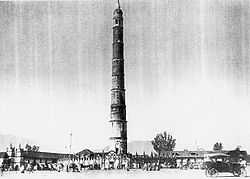Dharahara
| Dharahara धरहरा | |
|---|---|
 Dharahara before the 1933 earthquake | |
| Location | Kathmandu, Nepal |
| Coordinates | 27°41′53″N 85°18′22″E / 27.698°N 85.306°E |
| Elevation | 61.88m |
| Built | 1832 |
 Location in Kathmandu, Nepal
| |
Dharahara (Nepali: धरहरा), also called Bhimsen Tower, is a nine storey (61.88m) tall tower at the center of Sundhara,[1] Kathmandu. It is situated in the historical city of Kathmandu, and is a part of Architecture of Kathmandu recognized by UNESCO. It was built in 1832 by the Prime Minister of the time, Bhimsen Thapa of Nepal. Bhimsen Thapa built the tower under the orders of Queen Lalit Tripura Sundari.
The tower has a spiral staircase containing 213 steps.[2] The 8th floor holds a circular balcony for observers that provides a panoramic view of the whole Kathmandu valley. The tower has a 5.2m bronze mast on the roof. The tower has been open for the general public since 2005 for a small fee.
History
The present day Dharahara is actually the second such tower made by Bhimsen Thapa. The original Bhimsen Tower was built in 1824 and was 11 stories high, two stories taller than the present day Dharahara. Dharahara was built for Queen Lalit Tripura Sundari, who was the niece of Bhimsen Thapa. She wanted a tower of her own next to Bhimsen's original tower.
During the earthquake of 1834, both the towers survived, but Bhimsen's tower suffered severe damage. A hundred years later, on January 15, 1934, another earthquake caused Bhimsen's tower to be completely destroyed. Only two of the 11 stories on the second tower remained. The prime minister of the time, Juddha Shumsher, renovated Dharahara to its previous form. While the original Bhimsen Tower was obliterated, Queen Lalit Tripura Sundari's tower got its name, 'Bhimsen Stambha'. Sadly, the site where Bhimsen's original tower stood is now a parking lot.
.jpg)
Importance
The purpose for the construction of the Dharahara was military. It was used as a watchtower. In case some incidents of national importance occurred, bugles used to be blown from the top floor of the tower. This served to herald the message to the army men to assemble on urgent reason by blowing trumpet at the top floor of tower. The tradition of bugle trumpeting is still in practice. The statue of Shiva is placed at the top of the Tower,[3] and a golden spire crowns it.
Construction
The architecture of Dharahara is designed in Mughal and European style. Indeed it resembles like the Islamic minaret. The main materials used in the building construction is Vajra-Surki (Brick dust), Chuna (Lime), Mas (Black lentil) and Chaku (Caramel).
Current Situation
The fare for entering the sight and climbing is set at;[4]
- Foreigner - Around $4.00
- SAARC Nationals - Around $1.00
- Locals - NPR 50
- Locals over age 65 & under 5 - Free
The current situation and management of Dharahara has come under severe scrutiny of locals and tourists. The Heritage Department, Kathmandu Metropolitan City has come under severe criticism for its lack of effort to protect the heritage site.[5]
External links
- Official Site of Dharahara
- Satellite Image from Google Maps
- Google Sketch 3D model
- Another Google Sketch 3D model
References
- ↑ "Bhimsen Tower on LonelyPlanet Guide". The Lonely Planet. Retrieved 2011-12-14.
- ↑ "Bhimsen Tower on LonelyPlanet Guide". The Lonely Planet. Retrieved 2011-12-14.
- ↑ "Bhimsen Tower on LonelyPlanet Guide". The Lonely Planet. Retrieved 2011-12-14.
- ↑ "Bhimsen Tower on LonelyPlanet Guide". The Lonely Planet. Retrieved 2011-12-14.
- ↑ . Kantipur News Daily http://www.ekantipur.com/the-kathmandu-post/2010/12/16/metro/it-speaks-of-history-but-the-glory-is-lost/216112/. Missing or empty
|title=(help)
Coordinates: 27°42′02″N 85°18′42″E / 27.7006°N 85.3117°E